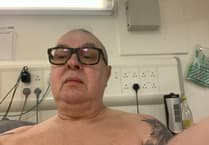A ward at Hereford County Hospital has been closed to visitors, due to increased incidents of diarrhoea and/or vomiting.
As a preventative measure, visiting to the Gilwern ward has been closed to prevent the further spread of Norovirus, which is affecting some patients.
Alison Johnson, consultant microbiologist at Wye Valley NHS Trust, said: “We’ve had to close the ward to visitors to help lessen the chance of the spread of diarrhoea and vomiting to both patients and visitors and other areas of the hospital.
“It’s important to note that the rest of the hospital remains open and is not affected. However, it’s very important that any visitors or outpatients with diarrhoea and/or vomiting do not visit any of our hospitals until they have been free of symptoms for 48 hours.
“Visitors to all areas of the hospital are requested to practice good hand hygiene and use the alcohol gels available in all wards and departments in order to prevent any further spread of infection.”
Wye Valley NHS Trust thanks all visitors for their understanding during this period and emphasises that these restrictions are in place to protect its patients, as part of its zero tolerance approach to healthcare associated infections.
There are some simple steps that the public can take to help stop Norovirus spreading:
• Wash your hands frequently and thoroughly with soap and warm water, particularly after using the toilet, and before preparing food. If you’re in an NHS facility pay attention to hand hygiene notices such as using hand gel upon entering and leaving a ward.
• Disinfect any surfaces or objects that could be contaminated with a Norovirus. It is best to use a bleach-based household cleaner. Always follow the instructions on the cleaning product.
• Flush away any infected faeces or vomit in the toilet. You should also keep the surrounding toilet area clean and hygienic.
• Wash any clothing, or linens, which could have become contaminated with a Norovirus. Washing with hot, soapy water will help to ensure that the virus is killed.
• Although people usually recover without treatment in 24-72 hours, it is important to stay away from work, school, college or any social gatherings until you have been free of symptoms for at least 48 hours.





Comments
This article has no comments yet. Be the first to leave a comment.